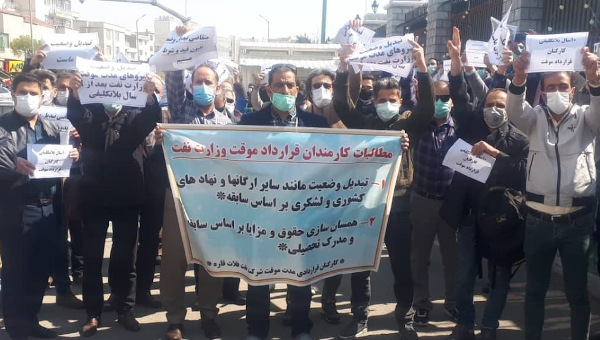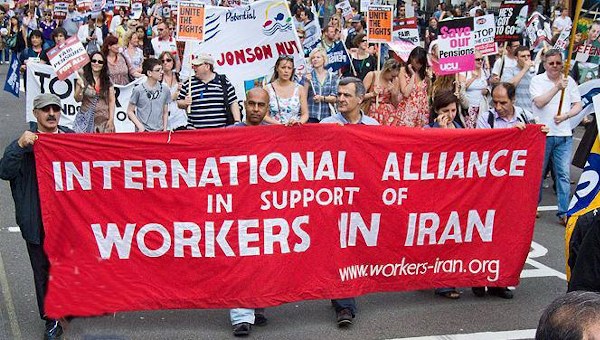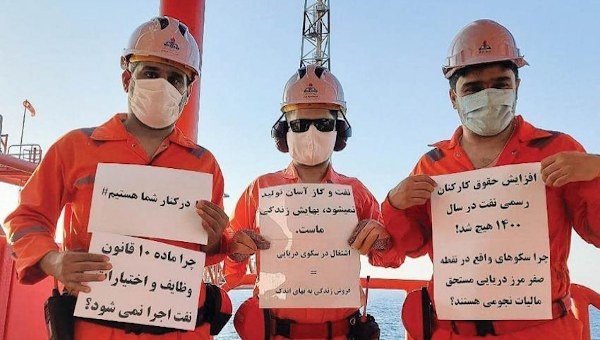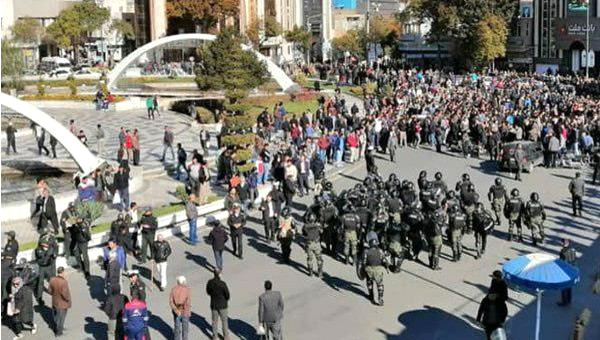Iranian Workers Unite in Huge Protest
A strike that started amongst one section of oil workers in southern Iran has spread to all oil exploration, refinery, and petrochemical plants in the country and is gaining widespread support from other workers too.
Throughout the 20th century, Iranian oil workers have played an important political role in the struggles of the Iranian people, demanding not only the nationalization of oil production in the 1950s, but also, participating in action against the Shah’s corrupt regime. The nationwide oil strike before the February 1979 uprising played a significant role in its overthrow.
Since coming to power, the Islamic Republic regime has been very wary of the importance of these workers, doing its utmost to weaken their power by privatizing large sections of the oil industry and deploying hundreds of contractors. The regime’s current divide and rule policy aims to impose a large number of contractors and to separate contract workers from permanent employees.

However, for the first time this century, Iran’s oil workers have managed to overcome these divisions, and through astute use of social media over the last couple of weeks, have succeeded in organizing what is increasingly looking like a widespread national workers’ protest. Their alliance with Haft Tappeh sugarcane workers and teachers is a significant development, coming at a time when US-imposed sanctions, as well as widespread corruption and incompetence, have made life unbearable for the Iranian working class. Hands Off the People of Iran (HOPOI) will continue to publicize these struggles and support all Iranian workers. •
This article first published on the Weekly Worker website.
Statement from the Council for Organizing Protests by Oil Contract Workers
We, the contract oil workers in refineries, petrochemical, and power plants, went on strike on June 20, as we had announced. Tens of thousands of our colleagues are currently on strike, and those who are permanent employees in the oil industry will come together in July. Meanwhile, during the same period, we have gained support from workers in the port of Assaluyeh. So far, we are doing well and we welcome all such support.
Friends, the oil workers’ central demand, both in the formal sector and the contract sector, is for wage increases. We workers will no longer tolerate poverty, insecurity, discrimination, inequality, and the deprivation of our basic human rights. As we have stated, as a result of staggering price rises, no workers’ wages should be less than 12 million toman. At the same time, our colleagues have the right to demand salary increases in accordance with their levels of work expertise. Our colleagues who are permanent employees of the oil industry are also protesting against the daily decrease in their purchasing power and the state of their wages in 1400 [2021-22], which is, in fact. an attack on their lives and livelihood.
Dear colleagues! Our unity in struggle and the fact that so many have joined the strike makes us very proud, and we express our thanks to everyone. However, we must try to consolidate this alliance to advance our protests.
We must prevent any kind of division and intrigue by doing our utmost to advance the struggle. We should continue making collective decisions – we cannot leave the struggle to a few individuals who are announcing campaigns in our defence here and there, allowing them to make all the decisions. Rather, by being present, staying in workers’ dormitories and planning protest rallies in front of refineries and oil centres, or by actively participating in the groups we have on social media, we should be involved on the ground every day in deciding how to advance our struggle.
This is an important lesson that we have learned from the Haft Tappeh sugarcane workers, and we must know that only in this way, and through council and collective decision-making, can we prevent possible divisions and clashes imposed from above. Do not let them mislead us with promises, and, as we have warned, if our demands are not met by the end of next month, we must prepare for wider protests.
Dear colleagues! During the last few days of striking, some of our colleagues have left their workplace and returned home, but some of us have remained in workers’ dormitories. This is because we want to pursue our demands through maximum presence. Ruthless employers are firing day labourers and preparing to hire new workers. Therefore, if we stay in the dormitories, the employers will not have a place to house the new workforce. At the same time, because of our presence, they will not dare to fire us and carry out such conspiracies. From this day on, our recommendation is to return after a week of visiting the family and then remain at the workplace, while continuing our strike. Our daily presence in front of petrochemical plants, refineries, and power plants is putting more pressure on the employers and helping us pursue our demands.
A number of colleagues who are day-contract workers in the Tehran refinery have been arrested. We must call for their release and the reinstatement of the 700 workers who have been sacked because of the strike.
Our strike is nationwide, and we must respond to any attacks with a united front.
In addition to an increase in wages, we are asking for 10 days leave for every 20 days of work, so that we can visit our families and get away from these deplorable conditions.
In addition, we contract workers need job security. Currently we have none, despite our health and lives being in constant danger through working in hazardous environments.
The living conditions in the workers’ dormitories are appalling, and there is no adherence to basic health and safety rules in the workplace. The laws governing special economic zones (where some oil refineries and exploration fields are situated) only serve the interests of the worst kind of capitalist bullies, to ensure their total dominance over workers. We demand a curtailing of the contractors’ unlimited power and provision of permanent contracts for all workers. We are calling for the abolition of special economic laws governing these zones, which pave the way for the imposition of severe military-style security measures in the oil fields.
Finally, we want to address the Iranian people. Our thanks to fellow workers, our comrades at Haft Tappeh Sugarcane plant, as well as teachers’ unions, associations of retired employees, and student organizations that have been supporting us with their statements. Have no doubt that this solidarity gives us, the oil workers, the strength we need.
The demand for wage increases is not just a demand put forward by oil workers: we know that all workers – teachers, retirees, and other wage-earners – have the same demand. Therefore, we expect the support and encouragement of fellow workers. Please protest against the dismissal of 700 of our fellow workers and demand their reinstatement. •
Council for Organizing Protests by Oil Contract Workers.
Translated and distributed by Hands Off the People of Iran website.





